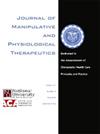徒手疗法对平衡的短期影响:多中心、随机、双盲对照试验
IF 1.4
4区 医学
Q4 HEALTH CARE SCIENCES & SERVICES
Journal of Manipulative and Physiological Therapeutics
Pub Date : 2023-03-01
DOI:10.1016/j.jmpt.2023.11.003
引用次数: 0
摘要
本研究的目的是分析健康参与者在接受手动治疗方案后动态和静态平衡的短期变化,并分析应用发音技术后对情绪和变化感知的影响。参与者被分配到手动治疗组(MTG)(n = 101)或无干预的对照组(CG)(n = 99),并在治疗前、干预后和治疗后一周进行测量。评估项目包括星形激越平衡测试、单足站立测试(UPST)、情绪状态档案(POMS)和患者整体变化印象量表(PGIC)。 结果200名健康参与者完成了研究(平均年龄22岁[SD = 2.67])。在右腿的前方(P = .003)、后内侧(P < .001)和后外侧(P = .001)方向上,各组与时间测量之间存在统计学意义上的显著交互作用,有利于 MTG;在左腿的前方(P < .001)、后内侧(P < .001)和后外侧(P = .012)方向上,各组与时间测量之间也存在统计学意义上的显著交互作用。分析未能显示出 UPST 和 POMS 的任何因素之间具有统计学意义的交互作用(P >.05)。与 CG 相比,MTG 在治疗后(P = .003)和一周随访时(P <.001)的 PGIC 量表上都有明显改善。治疗后和一周随访中对变化的感知也有明显改善。该方案似乎并未对静态平衡和情绪状态产生影响。手法治疗后的积极变化在短期内得以保持。本文章由计算机程序翻译,如有差异,请以英文原文为准。
Short-Term Effects of Manual Therapy on Balance: A Multicenter, Randomized, Double-Blind Controlled Trial
Objective
The purpose of this study was to analyze short-term changes in dynamic and static balance after a manual therapy protocol in healthy participants and analyze any repercussions on mood and perception of change after applying articulatory techniques.
Methods
A single-blind, randomized, multicenter clinical trial was conducted. Participants were allocated to either a manual therapy group (MTG) (n = 101) or a control group (CG) without intervention (n = 99), and measures were taken before treatment, after the intervention, and 1 week after treatment. Assessments included the Star Excursion Balance Test, Unipedal Stance Test (UPST), Profile of Mood States (POMS), and Patient Global Impression of Change (PGIC) scale.
Results
Two hundred healthy participants completed the study (mean age, 22 [SD = 2.67]). There was a statistically significant interaction between groups and time measurements in the right leg for anterior (P = .003), posteromedial (P < .001), and posterolateral (P = .001) directions in favor of the MTG, as well as in the left leg for anterior (P < .001), posteromedial (P < .001), and posterolateral (P = .012) directions. The analysis failed to show statistically significant interactions between any of the factors for the UPST and POMS (P > .05). The MTG showed a significant improvement compared to the CG after treatment (P = .003) and at 1-week follow-up (P < .001) on the PGIC scale.
Conclusion
The results suggest the MT intervention was effective on dynamic balance in post-intervention in healthy participants, and some of the directions maintained the results at 1-week follow-up. Perception of change in post-treatment and 1-week follow-up also significantly improved. The protocol did not seem to produce changes in static balance and mood states. Positive changes after manual therapy were maintained in the short term.
求助全文
通过发布文献求助,成功后即可免费获取论文全文。
去求助
来源期刊
CiteScore
3.00
自引率
7.70%
发文量
63
审稿时长
29 weeks
期刊介绍:
The Journal of Manipulative and Physiological Therapeutics (JMPT) is an international and interdisciplinary journal dedicated to the advancement of conservative health care principles and practices. The JMPT is the premier biomedical publication in the chiropractic profession and publishes peer reviewed, research articles and the Journal''s editorial board includes leading researchers from around the world.
The Journal publishes original primary research and review articles of the highest quality in relevant topic areas. The JMPT addresses practitioners and researchers needs by adding to their clinical and basic science knowledge and by informing them about relevant issues that influence health care practices.

 求助内容:
求助内容: 应助结果提醒方式:
应助结果提醒方式:


